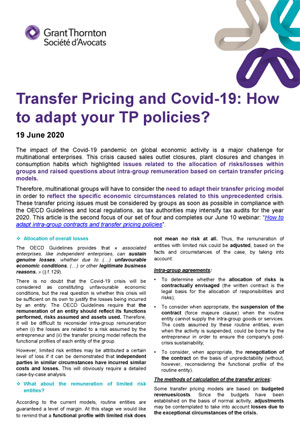-
Tax Policy Management
Tax Policy Management
-
Growth Management
Growth Management
-
Tax audit and litigation
Tax audit and litigation

-
Definition of a strategic and secure transfer pricing structure
Definition of a strategic and secure transfer pricing structure
-
Assistance in the development of international activities and operational reorganisations – “Business restructuring”
Assistance in the development of international activities and operational reorganisations – “Business restructuring”
-
Defense of practices and assistance in the context of tax audits and their follow-up from a litigation viewpoint
Defense of practices and assistance in the context of tax audits and their follow-up from a litigation viewpoint
-
Annual declaration and documentation obligations
Annual declaration and documentation obligations

-
Domestic and international VAT applicable to your company's flow
Domestic and international VAT applicable to your company's flow
-
Banking and financial VAT, VAT in the insurance sector
Banking and financial VAT, VAT in the insurance sector
-
VAT related to real estate registration fees
VAT related to real estate registration fees
-
VAT in the public and non-profit / association sector
VAT in the public and non-profit / association sector
-
Tax audit, tax litigation and relations with the Tax authorities
Tax audit, tax litigation and relations with the Tax authorities
-
Applicable rules for invoicing
Applicable rules for invoicing
-
Customs issues related to your company's international flows
Customs issues related to your company's international flows
-
French VAT registration and compliance obligations
French VAT registration and compliance obligations
-
Payroll tax
Payroll tax
-
Other indirect taxation
Other indirect taxation

-
Company transfer diagnosis
Company transfer diagnosis

-
Distribution strategy : Implementing and structuring
Distribution strategy : Implementing and structuring
-
Distribution activities digitalisation
Distribution activities digitalisation
-
Relations between suppliers and distributors
Relations between suppliers and distributors
-
Contractual policy : etablishing and structuring
Contractual policy : etablishing and structuring
-
Controls and litigation regarding payment terms
Controls and litigation regarding payment terms
-
Organising and securing commercial relations with consumers
Organising and securing commercial relations with consumers
-
Data protection - GDPR
Data protection - GDPR
-
Commercial Leases
Support in the management and contract management of commercial leases.

-
Traditional Services offered
Traditional Services offered
-
Health at work and quality of life at work
Health at work and quality of life at work
-
HR Management Audit
HR Management Audit
-
HR Engineering and People Change
Implementing managerial solutions in line with the company's strategic challenges
-
Management of HR compliance and internal investigations (harassment, discrimination, and whistleblowing)
Management of HR compliance and internal investigations (harassment, discrimination, and whistleblowing)

-
Advice on legal structuring
Advice on legal structuring
-
Day to day company management
Day to day company management
-
Companies reorganisation
Companies reorganisation
-
Mergers & Acquisitions - Private Equity
Mergers & Acquisitions - Private Equity
-
Changes in shareholder structure - Securities issue
Changes in shareholder structure - Securities issue
-
Governance and legal risks management
Governance and legal risks management

-
Development of an international mobility policy
Development of an international mobility policy
-
Coordination of reporting obligations for employees in a mobility situation
Coordination of reporting obligations for employees in a mobility situation
-
Advice on social security
Advice on social security
-
Assistance in labour law
Assistance in labour law

-
Management and protection of your portfolio of property rights
We put the most appropriate protection policy in place for our clients’ intellectual property rights.
-
Securing your projects: advisory and drafting of agreement services
We advise you on the feasibility of your project and the securing of your intellectual property and IT rights.
-
Enforcement of your rights: pre-litigation and litigation
Enforcement of your rights: detection of infringement, pre-litigation and litigation

The impact of the Covid-19 pandemic on global economic activity is a major challenge for multinational enterprises. This crisis caused sales outlet closures, plant closures and changes in consumption habits which highlighted issues related to the allocation of risks/losses within groups and raised questions about intra-group remuneration based on certain transfer pricing models.
Therefore, multinational groups will have to consider the need to adapt their transfer pricing model in order to reflect the specific economic circumstances related to this unprecedented crisis. These transfer pricing issues must be considered by groups as soon as possible in compliance with the OECD Guidelines and local regulations, as tax authorities may intensify tax audits for the year 2020. This article is the second focus of our set of four and completes our June 10 webinar: “How to adapt intra-group contracts and transfer pricing policies”.
Allocation of overall losses
The OECD Guidelines provides that « associated enterprises, like independent enterprises, can sustain genuine losses, whether due to (…) unfavourable economic conditions, (…) or other legitimate business reasons. » (§1.129).
There is no doubt that the Covid-19 crisis will be considered as constituting unfavourable economic conditions, but the real question is whether this crisis will be sufficient on its own to justify the losses being incurred by an entity. The OECD Guidelines require that the remuneration of an entity should reflect its functions performed, risks assumed and assets used. Therefore, it will be difficult to reconsider intra-group remuneration when (i) the losses are related to a risk assumed by the entrepreneur and (ii) the transfer pricing model reflects the functional profiles of each entity of the group.
However, limited risk entities may be attributed a certain level of loss if it can be demonstrated that independent parties in similar circumstances have incurred similar costs and losses. This will obviously require a detailed case-by-case analysis
What about the remuneration of limited risk entities?
According to the current models, routine entities are guaranteed a level of margin. At this stage we would like to remind that a functional profile with limited risk does not mean no risk at all. Thus, the remuneration of entities with limited risk could be adjusted, based on the facts and circumstances of the case, by taking into account:
Intra-group agreements:
- To determine whether the allocation of risks is contractually envisaged (the written contract is the legal basis for the allocation of responsibilities and risks);
- To consider when appropriate, the suspension of the contract (force majeure clause) when the routine entity cannot supply the intra-group goods or services. The costs assumed by these routine entities, even when the activity is suspended, could be borne by the entrepreneur in order to ensure the company's post-crisis sustainability;
- To consider, when appropriate, the renegotiation of the contract on the basis of unpredictability (without, however, reconsidering the functional profile of the routine entity).
The methods of calculation of the transfer prices:
Some transfer pricing models are based on budgeted revenues/costs. Since the budgets have been established on the basis of normal activity, adjustments may be contemplated to take into account losses due to the exceptional circumstances of the crisis.
In addition, local regulations have enabled companies to benefit from some measures (short-time working, deferral of charges, etc.). Therefore, those expenses have not been borne by the routine entity and should not be included in the cost base for the calculation of intra-group remuneration (de facto reducing the cost borne by the entrepreneur).
Adaptation of the economic analyses
The comparables used to justify the intra-group margin left at the level of the routine entities do not reflect the new economic conditions caused by the crisis. Indeed, these economic analyses are based on previous financial years since the most recent financial data available in databases is currently related to 2018.
At this stage and in order to reflect the 2020 financial year, it would be possible to:
- include loss-making companies or companies with a lower turnover in the set of comparable companies;
- extend the covered period (a three-year period is often used in practice) to reflect a full business cycle;
- adjust the financial data of the selected comparables based on periods of economic slowdown (as the economic crisis of 2008);
- use a different point in the arm's length range to reflect an arm's length remuneration.
All these possibilities will have to be considered and discussed in order to reflect the economic situation as closely as possible. On the other hand, it will be necessary to avoid any risk of challenge in the case of a tax audit.
Preparation of a transfer pricing documentation
It will be necessary to ensure the existence of a contemporaneous transfer pricing documentation that will be able to justify the intra-group remunerations and any adjustments made as a result of the Covid-19 crisis.
To ensure that the analyses are representative of the functions performed and risks assumed during the different phases of the crisis, it could be envisaged to distinguish the losses incurred and to quantify them at different times (pre-pandemic, during the pandemic and during the post-pandemic recovery period).
Authors: Pascal Luquet, Attorney-at-Law, Partner, Nadia Boudaoud, Tax Advisor, Jetlira Kurtaliqi, Tax Advisor.
















